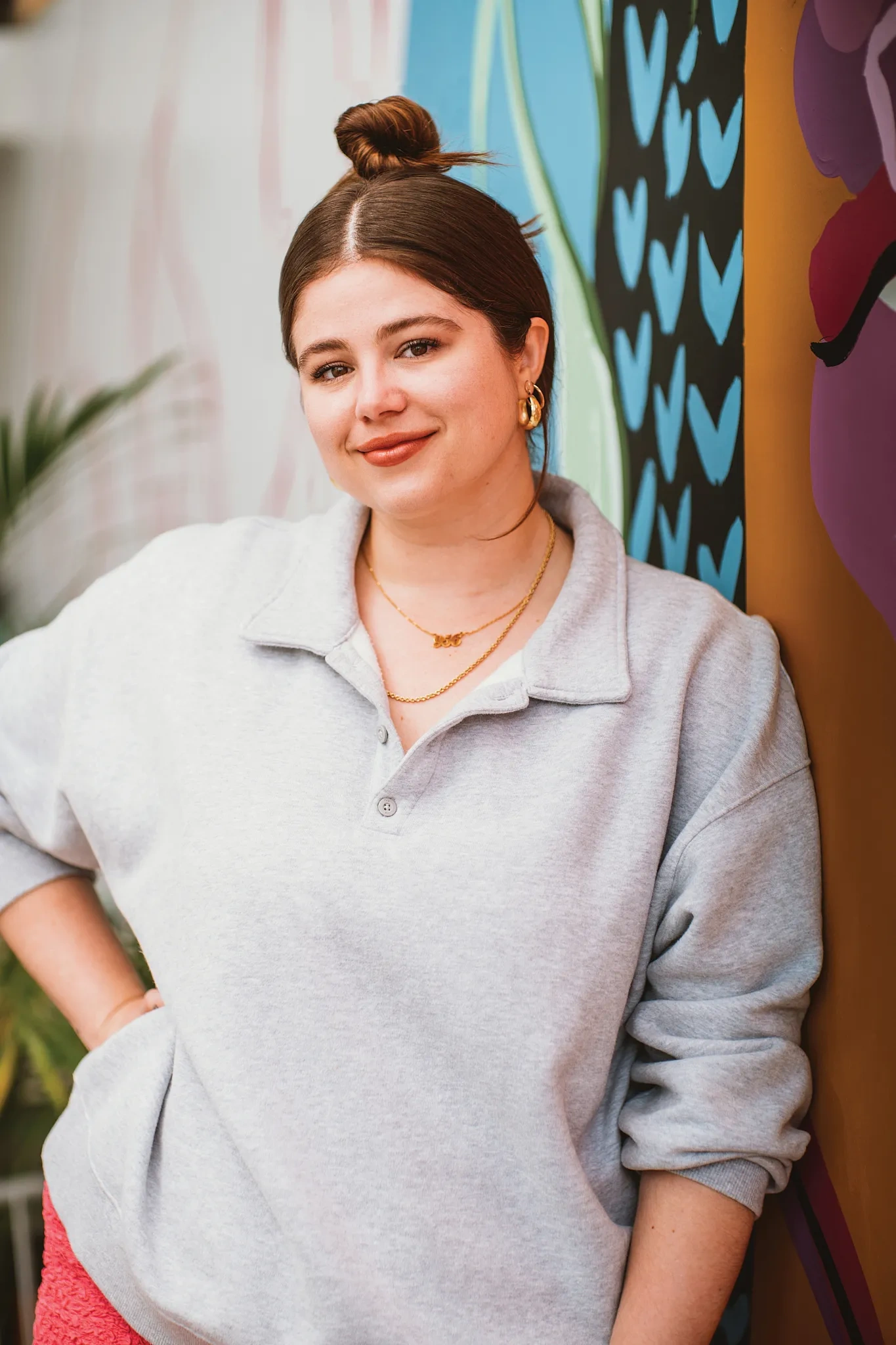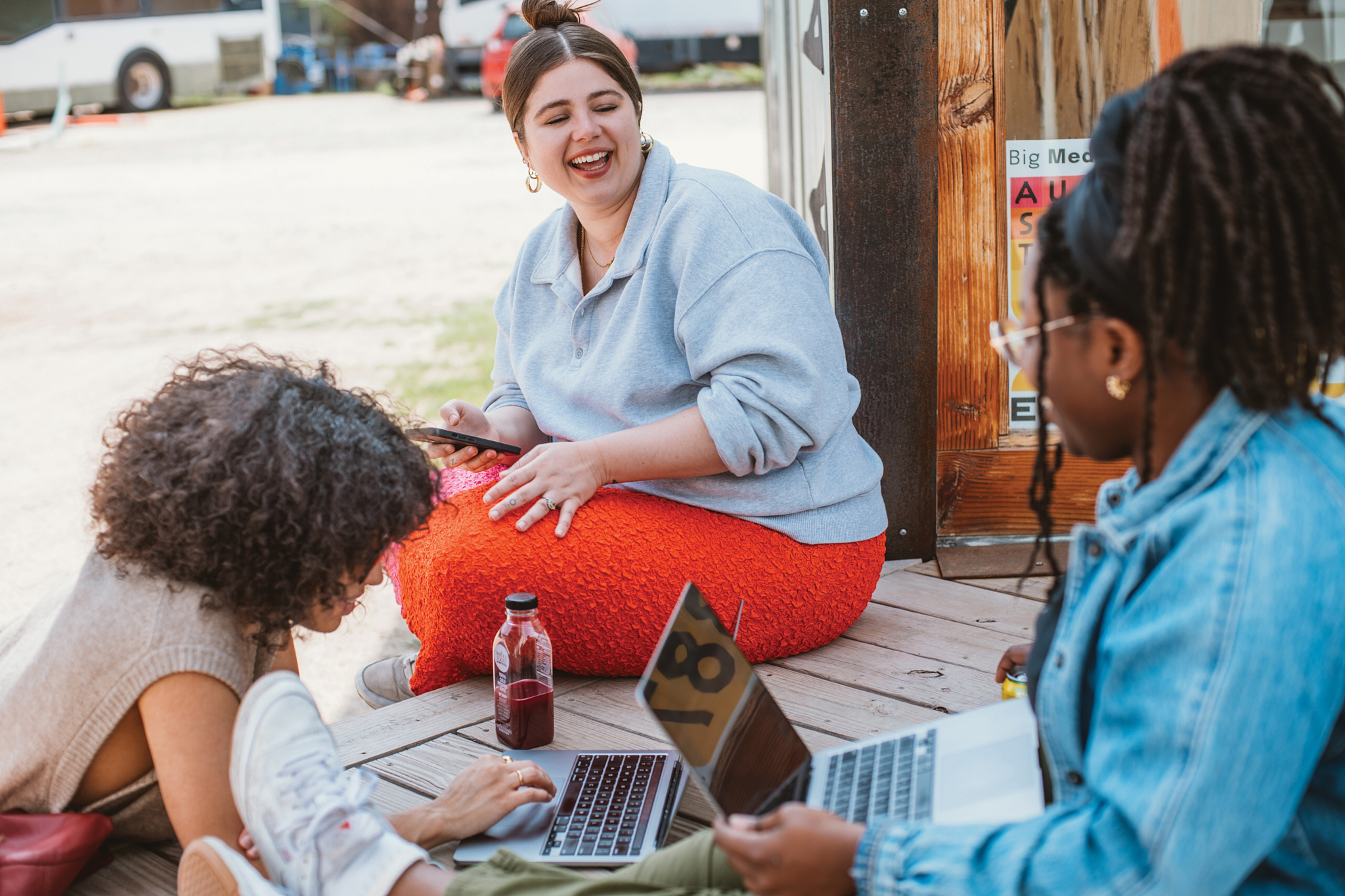Longhorn Jane Hervey Amplifying Creatives Through Nonprofit Future Front Texas

When Jane Hervey, BJ ’14, started writing for ORANGE Magazine as a UT undergrad, she realized for the first time that she had the power to define what was cool. As part of the independent lifestyle publication’s founding staff, Hervey was responsible for developing the look and feel of ORANGE, as well as curating its content.
“It was probably my first experience in creative collaboration,” Hervey says. “It was rough, it was gritty, we had no idea what we were doing. But it’s where I flexed a lot of my storytelling muscles, and I started thinking about how storytelling reflects and informs culture.”
But as Hervey continued to develop her voice as a witty cultural commentator—including publishing her first viral article about her hometown in the Rio Grande Valley on BuzzFeed in 2013—she realized creative commentary was still predominantly driven by men.
Now, Hervey has set out to diversify not only journalism, but creative work as a whole with Future Front Texas: a nonprofit that gives a platform to women and LGBTQ+ individuals through markets and festivals, as well as educational and networking events. With a community of around 1,800 artists and creative workers, Future Front has distributed more than $80,000 to grassroots initiatives since 2016. As a self-described “accidental nonprofit founder,” Hervey’s work with Future Front is driven by a desire to give marginalized creatives the recognition they deserve.
“Independent creatives and small business communities, where women and LGBTQ+ folks thrive—that’s where culture lives,” Hervey says. “When it comes to doing work that is meant to amplify certain identities or bridge gaps, you have to start with people. You can’t just start with words; you have to start with conversation in your community.”
So, Hervey did just that for a project her senior year. She began interviewing women working in creative fields including an independent muralist, a creative director at an ad agency, and several musicians. She specifically wanted to understand how they were affected by gender inequality in their professions.
“I was a little frightened at the time, because even though I had done a million internships … I was struggling to see any kind of career for myself in Texas,” Hervey says.
This is partly because Hervey felt pressure to change herself to be more “professional”—something she noticed many other women could relate to, whether they were working in a creative field or a corporate, white-collar one.
“It’s hard for me, in a creative industry, to be a woman who is not straight. I’m plus size, I don’t do the super [feminine] Texan makeup, I’ve shaved my head before,” Hervey says. “So, for me in this body and with that experience, I have gotten caught in the trap of feeling like I have to be super buttoned up and not myself.”
Hervey asked local artists and professionals if they felt the same, and whether they saw themselves represented in positions of power. Their collective frustration ran deep, but Hervey also realized there was a vibrant community of creative women in Austin lacking support. So, she started a blog called Boss Babes ATX to share their stories and organized a networking meetup before her graduation in 2016. That casual meetup soon led to regular events with mini markets, DJs, and a space for women and LGBTQ+ business owners to talk about what they do.

“We did meet-ups for about a year and a half, and then we started having markets and festivals,” Hervey says. “It grew beyond the blog into something much bigger.”
That “something” turned out to be Future Front. As the Boss Babes ATX community continued to expand, Hervey decided to apply for legal designation as a nonprofit in 2017. To support this, Hervey created a board of consistent volunteers and together, they decided it was time for a name change. Because the term “Boss Babe” was becoming oversaturated in the media, Future Front Texas was selected in 2022 to better define the organization’s values, membership, and goal of serving the greater Texas area.
Now, Future Front supports this community through the Front Market, where visitors can buy from underrepresented vendors, and the Front Festival, which features music and films from Texas women and LGBTQ+ creators. Between larger events, Future Front provides helpful resources—free guides on its blog, microgrants from its Our Creative Future of Texas Fund, and a residency program that hosts 15 Texas-based artists each year.
Texas defines small business as having 500 employees or less—many local small businesses have less than 10 employees. Future Front aims to support independent creatives, who fall closer to the latter category.
“Most of our small businesses are run by individuals—chefs, designers, freelancers—[and] predominantly women, queer folks, and people of color. These vendors are very under-supported in Texas,” Hervey says.
The Front Market, a biannual pop-up in Austin, helps platform more than 400 women and LGBTQ+ designers, makers, and artists in Texas like Alex Maldonado, the owner of Full Spectrum Ceramics. Maldonado initially started selling her pots, mugs, and other ceramics at markets to offload extra inventory, but she says the Front Market had the added benefit of helping her find community.
“Ceramics in general is a really white space. At the studio that I work out of, there aren’t very many employees, but I am the only Black one,” says Maldonado, who was at the Front Market in December 2022. “That’s why the market was nice because it had convenient access to other creatives of color, women, and LGBT creatives.”
Although Maldonado relocated to Seattle, she says she is grateful for the exposure that Future Front gave her when a picture of her at the market was uploaded to its social media channels. This helped connect her with a buyer in Sedona, who she shipped her first out-of-state order to. Beyond expanding customer bases, Hervey says Future Front also helps creatives network to share business resources.
“One of the common denominators for underrepresented communities is not having access to social support,” Hervey says. “If you don’t know somebody who can give you thousands of dollars to start your business or someone who has done accounting … you have to find a community around your work.”

Future Front serves as Hervey’s community around her personal creative work, which includes releasing music under the moniker “Jane Claire” and running her own branding and consultancy studio, Group Work. With so much on her plate, her relationships with Future Front members like board president Xochi Solis, BFA ’05, keep her grounded.
Solis is an Austin-born mixed media artist and member of Chulita Vinyl Club, which similarly platforms DJs who are women and LGBTQ+ people of color. Solis first met Hervey when she asked Solis to spin records at a Future Front event, where they connected over their shared experience breaking into male-dominated creative fields. Solis continued to volunteer with Future Front and went on to join the board, where she and Hervey frequently “co-conspire” in their mission to change the status quo.
“We have a monthly check in, and a lot of them are just us talking through what it means to be a leader in the community—things that can sometimes be really isolating,” Solis says. “We [have to] continually remind ourselves that we’re artists too, because sometimes when you’re working on the admin [side] of something, you kind of lose yourself.”
To keep from losing herself in her work, Hervey infuses her projects with personal interest. She thinks of Future Front as a way to bring together the creative voices she finds compelling in the kind of environment she would want to work in.
“I have really burnt myself out [in the past] trying to find a seat at the table with people who don’t really care about my ideas and think they have done enough by including me,” Hervey says. “You have to respect the value people bring beyond their identity. That’s what I want to see more of in our industry.”
CREDITS: Sandy Carson





